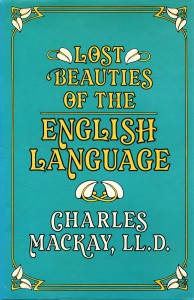 My edition of Lost Beauties of the English Language, a book originally published in 1874, is a reprint published in 1987 by Bibliophile Books in the UK. How it came to be in the Chicago bookstore where I bought it toward the end of the ’80s — maybe the incomparable Stuart Brent Books on Michigan Ave. — I don’t know.
My edition of Lost Beauties of the English Language, a book originally published in 1874, is a reprint published in 1987 by Bibliophile Books in the UK. How it came to be in the Chicago bookstore where I bought it toward the end of the ’80s — maybe the incomparable Stuart Brent Books on Michigan Ave. — I don’t know.
But I’m glad I have it. All dictionaries are good for browsing, but Lost Beauties is especially charming. You find things like:
Barrel fever: the headache caused by intemperance in ale or beer.
Crambles: boughs and branches of trees, broken off by wind.
Farthel: the fourth part of anything (related to farthing, which I figure is pretty much lost as well).
Glunch: to frown.
Keech: a fat, round lump, whence also a keg (of butter).
Pingle: to eat with very little appetite.
Well-will: the opposite of ill-will.
Wordridden: to be a slave to words without understanding their meaning; to be overawed by a word rather than by an argument.
Two of my favorite lost beauties are actually prefixes, namely alder- and um-.
Alder: a prefix formerly used to intensify the meaning of an adjective in the superlative degree — as if to better the best, and heighten the highest… In Wicliff’s Bible, the Almighty is called the Alder-Father and also the Alder-Creator.
Other examples: alderbest, alderfirst, alderforemost, alderhighest, adlerlast, adlertruest, alderworst, and I guess it does survive in fossilized form in “alderman.” A little bit better than the best seems to defy the internal logic of superlatives, but language isn’t entirely subject to logic. There’s clearly a place for the alder- formation in English, or there could be.
Um: round or around.
Umgang: circuit, circumference
Umlap: to enfold
Umset: to surround
The author, Charles Mackay (1814-89), was a Scotsman better known for writing Extraordinary Popular Delusions and the Madness of Crowds (1841), which covered a lot of ground, including the South Sea Company Bubble, tulip mania, witch hunts, alchemy, crusades, fortune-telling and more. “Men, it has been well said, think in herds; it will be seen that they go mad in herds, while they only recover their senses slowly, and one by one,” Mackay wrote. Sounds about right to me.
One of the more interesting aspects of Lost Beauties, as least for an American reader in our time, are the words he includes that aren’t lost to American English. Perhaps Mackay didn’t know that they were still used on this side of the Atlantic, or maybe some of them were revived in the 20th century in American English. But I think it’s more likely that he knew that some of the words were spoken here, but also felt that that didn’t count.
Such as: egg on (verb), gruesome, laze (verb), pinchpenny, rung (as in the step of a ladder), swelter (in the heat), watershed.